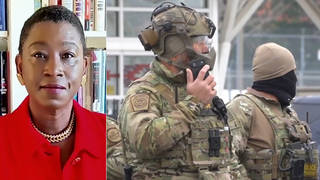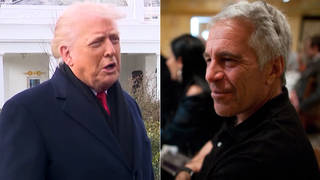
The Supreme Court has heard oral arguments in a case challenging Trump’s now-halted order to end birthright citizenship. Multiple lower courts have already ruled that the order is unconstitutional. Trump’s lawyers are seeking to reinterpret the 14th Amendment, which has guaranteed citizenship to any child born in the United States for over a century. Legal expert Andrea Flores, an immigration lawyer at FWD.us, says the government’s weak arguments about implementing the unprecedented anti-immigrant order indicate that “The administration is not prepared to do this. They just want the authority to reinterpret amendments.”
Transcript
AMY GOODMAN: This is Democracy Now!, democracynow.org.
Supreme Court justices heard oral arguments on Thursday in a case stemming from Trump’s now-halted order to end birthright citizenship, which is guaranteed under the 14th Amendment. The Trump administration is challenging whether federal judges can issue universal, or nationwide, injunctions against his orders. The case is raising alarms the far-right-dominated Supreme Court could hand even more power to the executive branch as Trump seeks to overcome court injunctions against his many executive orders.
This is Justice Ketanji Brown Jackson.
JUSTICE KETANJI BROWN JACKSON: Your argument seems to turn our justice system, in my view at least, into a “catch me if you can” kind of regime from the standpoint of the executive, where everybody has to have a lawyer and file a lawsuit in order for the government to stop violating people’s rights.
AMY GOODMAN: For more, we’re joined by Andrea Flores, the lawyer and vice president for immigration policy and campaigns at FWD.us. Her opinion essay for The New York Times is headlined “The Birthright Citizenship Case Could Split the Country in Two.”
You also have this piece, the other headline, “What’s Really at Stake in the U.S. Supreme Court [Case] on Birthright Citizenship.” What is really at stake, Andrea Flores?
ANDREA FLORES: So, what’s at stake is the definition of U.S. citizenship and also what it means to be an American. So, American citizens, how do you prove that you are a U.S. citizen? You use your birth certificate. If the Supreme Court grants the government this relief, if they narrow this injunction, then in half the country the question of who is a citizen will once again be determined by the states. And, you know, the last time that happened, that was the precursor to the Civil War.
There is absolutely no plan by the federal government in how you would implement that or how you would prevent mistakes, discrimination. So, really, what’s at stake is how we all define ourselves to be a citizen and how we prove we’re citizens.
AMY GOODMAN: So, explain what’s going on here, because two things are going on. You have the issue of birthright citizenship being debated in these oral arguments, but then you have the procedural stuff around whether judges can issue nationwide injunctions.
ANDREA FLORES: It’s a really interesting case, because there is this constitutional question around nationwide injunctions, which I’ve served in Democratic administrations and had policies that I’ve worked on be blocked nationwide, right? And that’s been a burden for, you know, both parties. But on the other side, you have an executive order that attempts to reinterpret the meaning of the 14th Amendment, which has been settled law since 1898.
So, what does the government do? What does the Trump administration do? They actually — they don’t want to lead with their worst argument, which, as a lawyer, makes sense to me. Instead, they did a series of emergency filings on that first legal question, which is: Are nationwide injunctions an overstep of a district court’s authority? But by doing that, what they’re essentially trying to do is find a backdoor mechanism to implement an order that multiple courts have found to be unconstitutional. They didn’t argue. They didn’t even defend their order as constitutional, because most would agree that it is absolutely not.
And so, you know, the Supreme Court here cannot ignore that point. This is not a usual case. And I think you heard that from the justices. You know, you even heard Justice Kavanaugh say, ask, press the government on how would this even take place in 20 to 30 days, and they could not provide answers. So they are trying to use a procedural move. But in doing so, I want to point out, they really picked a case that made the best support for nationwide injunctions, right? Because if you split the country in two, and you have a child born in South Carolina not be a citizen, but a child born in North Carolina be a citizen, that’s going to be a catastrophe.
AMY GOODMAN: So, I want to go to, I mean, the order now blocked by a nationwide injunction. But conservative Justice Brett Kavanaugh pressed the Trump administration’s lawyer, the Solicitor General John Sauer, for details on how it would be carried out.
JUSTICE BRETT KAVANAUGH: On the day after it goes into effect — this is just a very practical question, how this is going to work — what do hospitals do with a newborn? What do states do with a newborn?
JOHN SAUER: I don’t think they do anything different. What the executive order says in Section 2 is that federal officials do not accept documents that have the wrong designation of citizenship from people who are subject to the executive order.
JUSTICE BRETT KAVANAUGH: How are they going to know that?
JOHN SAUER: The states can continue to — the federal officials will have to figure that out, essentially.
JUSTICE BRETT KAVANAUGH: How?
JOHN SAUER: So, you can imagine a number of ways that the federal officials could —
JUSTICE BRETT KAVANAUGH: Such as?
JOHN SAUER: Such as they can require a showing of, you know, documentation showing legal presence in the country. For a temporary visitor, for example, they could see whether they’re on a B-1 visa, which would exclude, kind of, the birthright citizenship in that context.
JUSTICE BRETT KAVANAUGH: For all the newborns? Is that how it’s going to work?
AMY GOODMAN: So, that’s Supreme Court Justice Brett Kavanaugh questioning the solicitor general, the Trump administration’s lawyer, John Sauer. Can you translate that into lay terms? Brett Kavanaugh saying, “What’s going to happen to these babies born in hospitals around the country?”
ANDREA FLORES: Well, as a former government official, it’s stunning that they issued an executive order and then, months later, could not answer those questions, because, sort of, as I write in my op-ed, the onus now will be on hospitals. It will be on states. Can you imagine a delivering mother having to also prove her immigration status or citizenship status in the delivery room? I think people are also underestimating, like, the maternal health outcomes.
And the fact that the solicitor general wasn’t prepared for how this would impact the community, when they had filed — and they treated this as an emergency. They treated it as though our Constitution, as it has functioned now since 1898, has been an emergency. So, just to translate it, this government is not prepared. The administration is not prepared to do this. They just want the authority to reinterpret amendments. And you see them do the same thing for multiple amendments in the Constitution. The First Amendment, they are curtailing free speech by arresting international students. The Fifth Amendment, they are denying due process. They’ve disappeared over 200 people to a foreign prison. And now the 14th Amendment. And if the Supreme Court grants this relief, they will be emboldened, and I imagine we see executive orders on each of those fundamental rights, which is why every American cannot dismiss this as an immigration case. This is a constitutional, really, test for the Supreme Court, and I hope that they do the right thing here.
AMY GOODMAN: Andrea Flores, I want to thank you so much for being with us, vice president for immigration policy and campaigns at FWD.us. We’ll link to your piece, “What’s Really at Stake in the U.S. Supreme Court Case on Birthright Citizenship.” Special thanks to my brother, journalist David Goodman. I’m Amy Goodman. Thanks for joining us.












Media Options